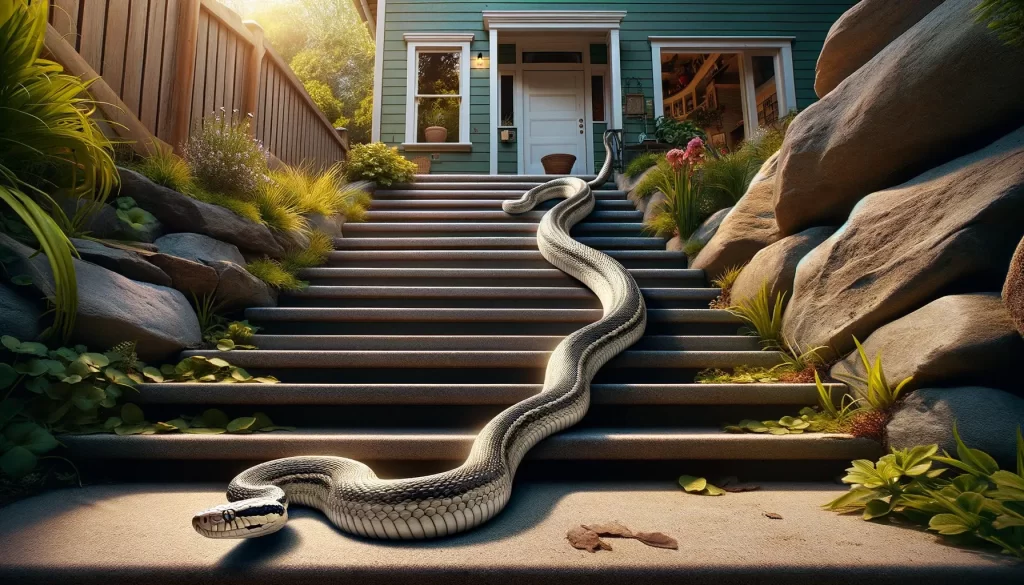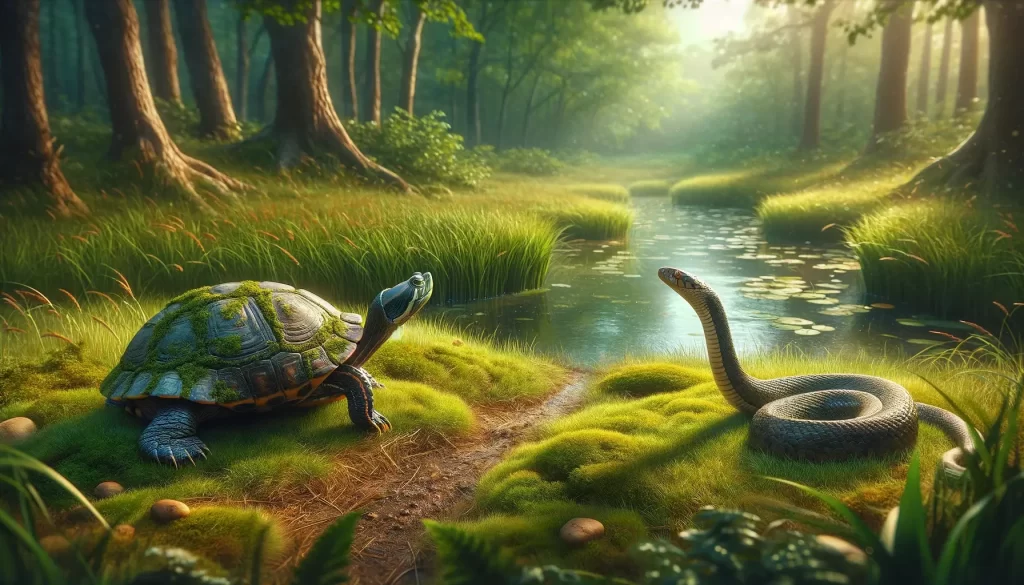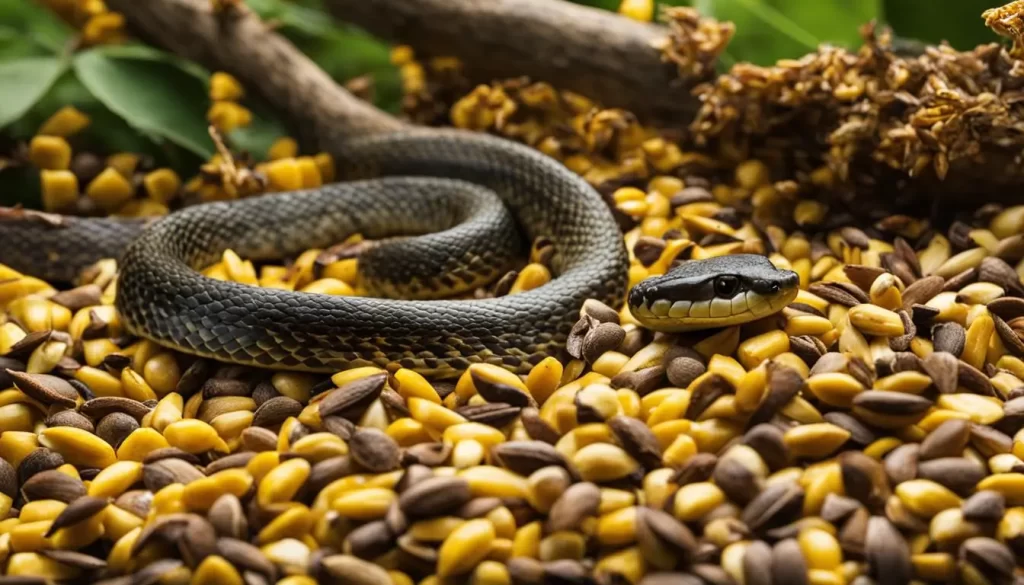
Hi there! Are you curious to know if snakes eat bird seed? Well, you’ve come to the right place! I’m here to unravel the myths and facts surrounding this intriguing topic. Let’s dive in and find out the truth about snake diets and whether bird seed is on the menu.
No, snakes do not eat bird seed. Snakes are carnivorous and their diet typically consists of live prey such as rodents, birds, eggs, and insects. Bird seed is not a suitable or nutritious food source for snakes and can result in nutritional deficiencies and health issues if fed to them.
Key Takeaways:
- ✅ Snakes primarily eat small rodents, birds, insects, and other reptiles.
- ✅ Bird seed is not a natural food source for snakes.
- ✅ Feeding snakes bird seed can result in nutritional deficiencies and health issues.
- ✅ It is important to provide snakes with a balanced diet that consists of their natural prey items.
- ✅ Research and understand the specific dietary needs of your snake’s species and size for their optimal health and well-being.
What Do Snakes Eat?
Snakes have diverse feeding habits that vary based on their species and size. As carnivorous creatures, most snakes feed on small mammals like mice and rats, birds, and even other reptiles.
Some larger snake species, such as pythons and anacondas, can consume much larger prey like deer and pigs.
Snakes are opportunistic eaters, meaning they will consume whatever prey is readily available in their habitat.
However, it is crucial to provide captive snakes with a diet that closely resembles their natural prey items to ensure their nutritional needs are met.
Snakes have specific dietary requirements, including the right balance of proteins, nutrients, and vitamins.
By offering them a diet that mimics what they would eat in the wild, we can ensure their overall well-being and longevity.
Feeding captive snakes a diet that is appropriate for their species and size is essential. This helps avoid nutritional deficiencies and ensures that they thrive in captivity.
Providing snakes with a suitable diet helps maintain their health, promotes proper growth, and supports their natural behaviors.
As responsible snake owners, it is essential to research and understand the dietary needs of our specific snake species.
This knowledge enables us to provide them with a varied and balanced diet that meets their nutritional requirements.
By feeding them a diet that closely resembles their natural prey, we can ensure their health and happiness in captivity.
Some snakes may have specific dietary needs or preferences, and it is important to accommodate them as well. For example, certain species may require a diet consisting mainly of fish or amphibians. Understanding the specific feeding habits of your snake is crucial to maintaining their overall health and well-being.
Can Snakes Eat Bird Seed?
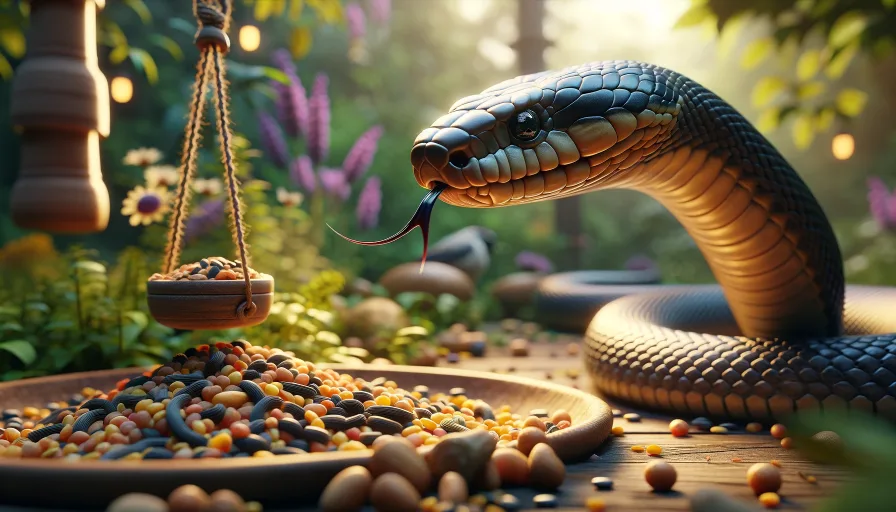
While it is possible for a snake to accidentally consume bird seed if it is in their environment, it is not a suitable or nutritious food source for them.
Snakes require a diet that consists of prey items that provide the necessary nutrients, proteins, and vitamins for their growth and survival.
Feeding snakes bird seed can result in nutritional deficiencies and health issues. Bird seed lacks the essential components that snakes need to thrive, such as the correct balance of nutrients and proteins.
It is important to research and provide appropriate prey items for your snake’s species and size to ensure their health and well-being.
Snakes are carnivorous creatures and primarily eat small rodents, birds, insects, and other reptiles. These prey items provide the necessary nutrients and proteins that snakes need to maintain their health.
Including bird seed in a snake’s diet can lead to imbalances in their nutritional intake.
In addition, feeding snakes bird seed can cause digestive issues. Snakes have specialized digestive systems that are designed to process specific types of food.
Bird seed does not suit the digestive needs of snakes and can potentially cause blockages or other complications.
To ensure the proper nutrition of your pet snake, it is best to stick to their natural diet consisting of their prey’s species and size.
This will help maintain their health, promote proper growth, and prevent any potential health problems associated with an improper diet.
Remember, each snake species has its own specific dietary requirements. Consulting with a reptile veterinarian or reptile expert can provide valuable guidance on the appropriate diet for your snake.
Snake Feeding Habits
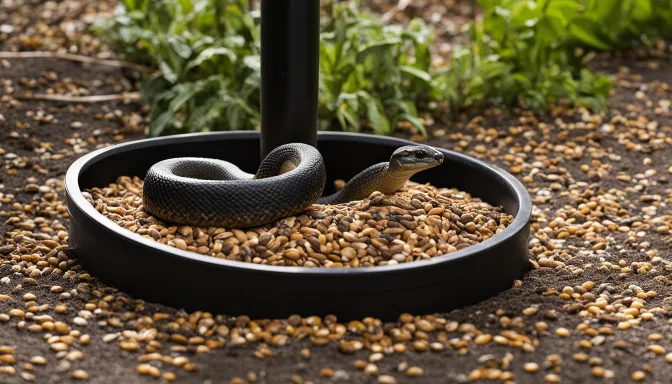
When it comes to feeding, snakes have fascinating habits that set them apart from other animals.
Their ability to swallow prey whole is due to their flexible jaws, which can stretch to accommodate larger prey items. This unique adaptation allows them to consume prey much larger than their own head size.
After a snake ingests its meal, it enters a period of digestion. During this time, the snake’s metabolic rate slows down as it breaks down the food and absorbs the nutrients.
The duration of the digestion process depends on the snake’s species and size.
Snake Feeding Frequency:
The frequency of snake feeding varies depending on factors such as species and size. Smaller snakes, like corn snakes or garter snakes, typically feed once a week due to their faster metabolism and smaller energy requirements.
On the other hand, larger snakes such as pythons or boas may eat once every few weeks or even months. These species have a slower metabolic rate and can go longer periods without food.
Monitoring Feeding Habits:
It is crucial to closely monitor the feeding habits of pet snakes to ensure their health and well-being.
Observing factors such as appetite, weight, and overall behavior can help determine if a snake is adequately fed.
Any sudden changes in feeding patterns or refusal to eat should be addressed promptly to prevent potential health issues.
Providing snakes with appropriate prey items is essential for their nutrition. Feeding snakes a balanced diet that resembles their natural prey items is crucial to meet their nutritional needs and promote overall health.
It is important to consult reputable sources or seek advice from a veterinarian or experienced snake owner to determine the most suitable diet for your snake’s species and size.
Having a good understanding of snake feeding habits is fundamental for snake owners to ensure the well-being and longevity of their pets.
By considering the unique requirements of each snake species and monitoring their feeding habits closely, we can provide these fascinating creatures with a healthy and satisfying diet.
Myths about Snakes’ Diets
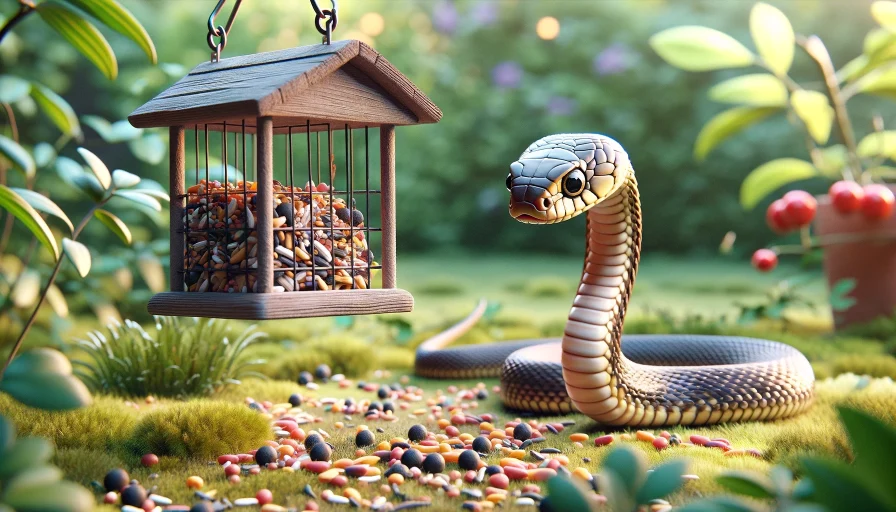
There are many myths and misconceptions surrounding snake diets. One common myth is that snakes need to eat live prey to be healthy.
While some snakes in the wild may primarily feed on live prey, it is not necessary for captive snakes. Snakes can thrive on a diet of properly prepared frozen/thawed prey.
Another myth is that snakes only eat once a month. The frequency of snake feeding depends on the species and its size.
Some smaller snakes may require more frequent feedings, while larger snakes may eat less often.
It is important to research and understand the specific dietary needs of your snake’s species to ensure they are getting the proper nutrition.
Snake Diets come in various forms, and it’s essential to separate fact from fiction. Feeding captive snakes properly is crucial for their health and well-being.
- Myth 1: Snakes need to eat live prey.
- Fact: Snakes can thrive on a diet of frozen/thawed prey.
- Myth 2: Snakes only eat once a month.
- Fact: The feeding frequency varies based on the snake species and size.
Understanding these common myths about snake diets is vital for snake owners. It allows us to provide our slithering companions with the proper nutrition they need to stay healthy and thrive.
The Benefits of Feeding Frozen/Thawed Prey
Feeding snakes frozen/thawed prey has several benefits.
- Safety: One of the main advantages of feeding snakes frozen/thawed prey is that it provides a safer option for both the snake and the owner. Live prey, such as mice or rats, can bite and injure the snake during the feeding process. By offering frozen/thawed prey, this risk is eliminated, ensuring the well-being of your snake.
. - Convenience: Another benefit is the convenience it offers. Frozen/thawed prey can be purchased in bulk and stored in the freezer until needed. This allows snake owners to have a readily available food supply, reducing the need for frequent trips to the store or dealing with live prey.
. - Cost-effectiveness: Feeding frozen/thawed prey is also a cost-effective option. Buying frozen prey in bulk tends to be more economical than purchasing live prey on a regular basis. It can help snake owners save money while still providing their snakes with a nutritious diet.
. - Healthier Option: Frozen prey is typically bred and raised in controlled environments, ensuring that they are nutritionally balanced and free from parasites or diseases that could potentially harm the snake. This makes frozen/thawed prey a healthier option for your snake’s diet.
Feeding frozen/thawed prey is a common practice among snake owners and breeders. It not only offers safety and convenience but also provides a nutritionally balanced and healthier diet for snakes.
Consider incorporating frozen/thawed prey into your snake’s feeding routine to ensure their well-being and longevity.
Conclusion
In conclusion, it is clear that bird seed is not a suitable food source for snakes. While snakes may accidentally consume bird seed if it is present in their environment, it does not provide the necessary nutrients and proteins that snakes need to thrive.
Snakes require a diet that consists of their natural prey items, such as small rodents, birds, and reptiles.
Feeding snakes bird seed can result in nutritional deficiencies and health issues. It is vital for snake owners to research and provide appropriate prey items that align with their snake’s species and size.
A balanced and nutritious diet is essential for the health and well-being of snakes.
To ensure the optimal care of your snake, consult a veterinarian or a reptile specialist who can provide you with expert advice on the appropriate diet for your specific snake species.
By feeding your snake a proper diet, you will help ensure that they live a long and healthy life.
Frequently Asked Questions
Q: Do snakes eat bird seed?
A: No, snakes do not eat bird seed. Snakes are carnivorous and their diet typically consists of live prey such as rodents, birds, eggs, and insects.
Q: Do snakes eat bird seed in California?
A: No, snakes in California, like snakes everywhere, do not eat bird seed. They are carnivores and primarily feed on animals, not plant-based foods like bird seeds.
Q: What do snakes typically eat in their natural diet?
A: Snakes typically eat a diet of live prey, which includes rodents, small mammals, birds, eggs, fish, insects, and amphibians. The exact diet varies depending on the species of snake and its natural habitat.
Q: Can snakes digest plant-based foods like bird seed?
A: Snakes cannot properly digest plant-based foods like bird seed. They lack the digestive enzymes necessary to break down plant matter, as their diet in the wild consists almost entirely of animal prey.
Q: What attracts snakes to bird feeders?
A: Snakes are attracted to bird feeders not because of the seed, but because bird feeders can attract rodents, birds, and other small animals that snakes prey upon. The presence of these animals can indirectly attract snakes to the area around bird feeders.
Q: How can bird feeders be made safe from snakes?
A: To make bird feeders safe from snakes, keep the ground beneath them clean to avoid attracting rodents. Use pole-mounted feeders with baffles to prevent snakes from climbing up. Regularly inspect and maintain the area to ensure it is not hospitable to snakes.
Q: What types of birds’ seeds are most likely to attract snakes?
A: It’s not the type of bird seed that attracts snakes, but the presence of birds and rodents that are drawn to the seeds. Any spilled seed that attracts rodents can indirectly attract snakes.
Q: Are snakes a threat to birds at bird feeders?
A: Snakes can be a threat to birds, especially young or small birds, at bird feeders. While they do not come for the seeds, snakes might prey on the birds themselves, particularly if the feeder is easily accessible from the ground or a tree.


